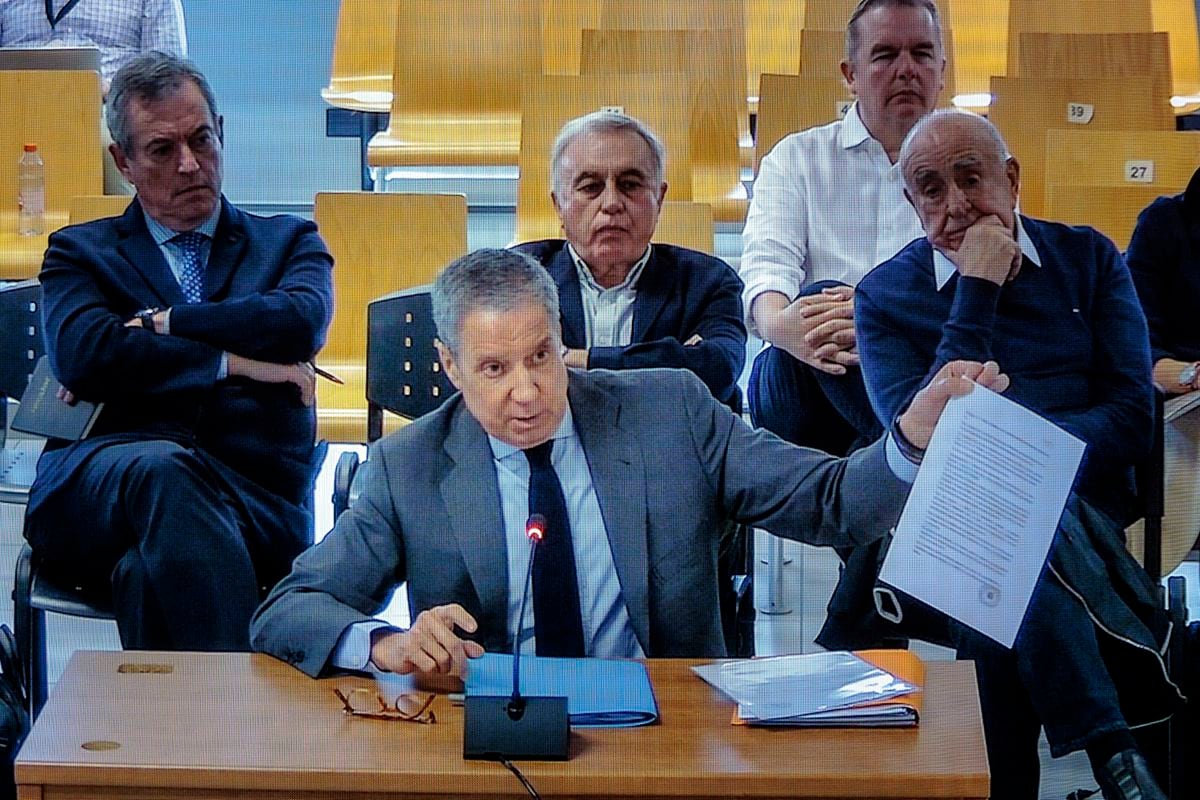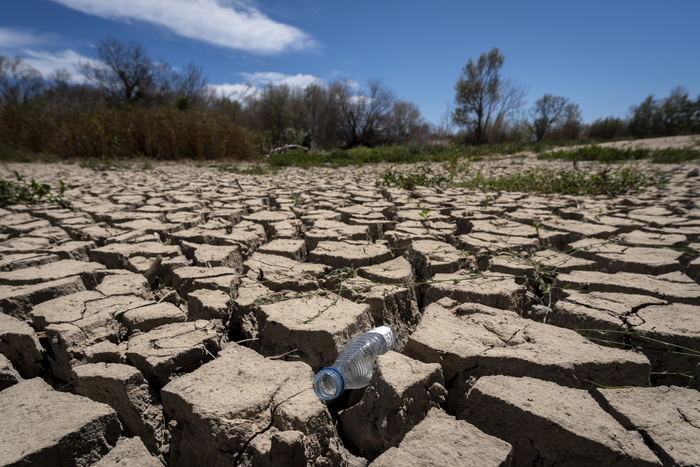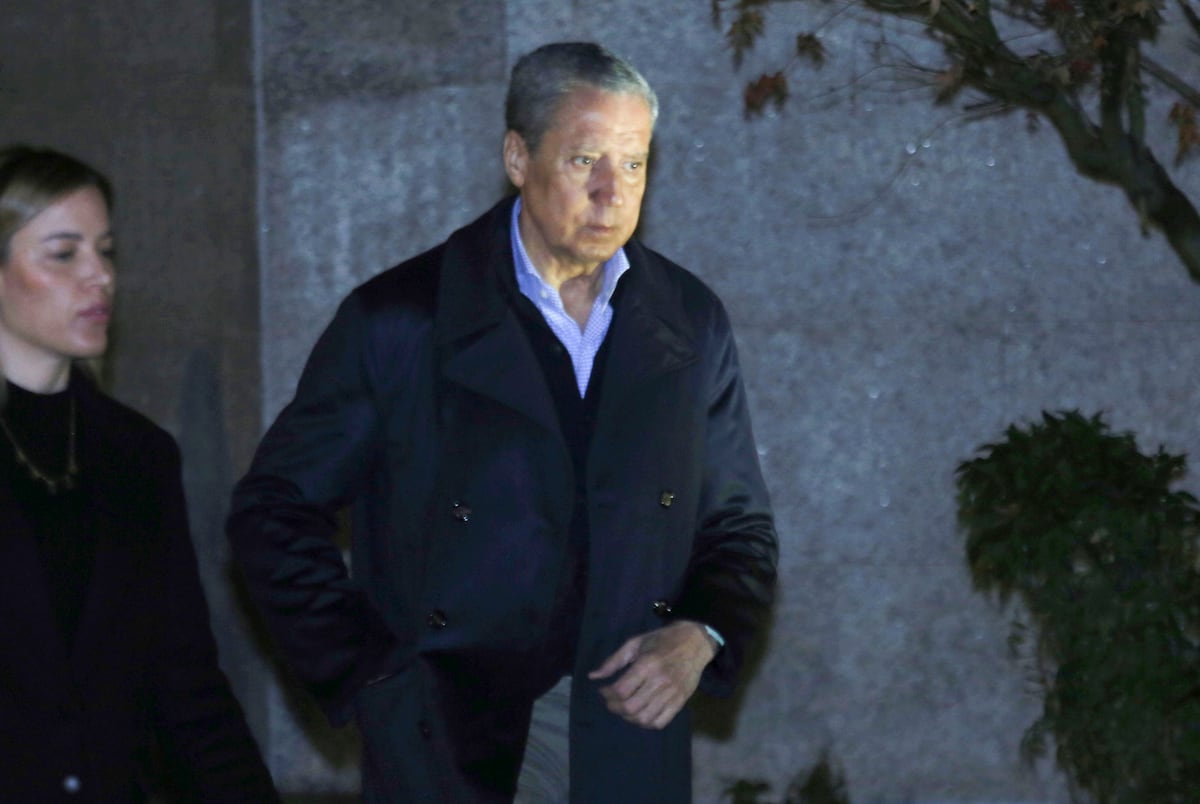The ITV of the Vara de Quart industrial estate, in Valencia, in an image from this morning. Mònica Torres
The seven ITV concessionaire companies in the Valencian Community are on the warpath against the Generalitat for their plans to revert the service to public management.
The Consell, chaired by the socialist Ximo Puig, who governs in coalition with Compromís and Unides Podem, notified last September of the non-renewal, once their term expired, of the privatization contracts for the Technical Vehicle Inspection services ( ITV) signed 25 years ago by former president Eduardo Zaplana, of the PP.
Paco Llopis and Manuel Trigo, representatives of the Association of Concessionaire Entities of the Valencian Community for the Technical Inspection of Vehicles (AECOVA-ITV), have announced this morning in Valencia that they will claim compensation from the Administration of more than 130 million euros for what they consider “illegal rates”.
Four years ago, the Generalitat imposed a reduction in the cost of the inspections that all motor vehicles are obliged to pass with a periodicity that depends on their age.
This obligation guarantees income and, therefore, the business.
The powers in the ITV are transferred to the autonomous communities.
In Valencia there are 25 fixed and six ITV mobile stations currently in operation and a dozen planned soon.
With the approval last Friday of a decree law that authorizes the creation of the public company Societat Valenciana d'ITV, which will manage the inspections and absorb the 1,200 workers in the sector, the Generalitat launches a reversal that will materialize from 2023 , which has caused the upsurge of the confrontation between the firms and the Administration.
The companies predict a long litigation with threats of criminal actions and reports contrary to those of the Administration.
The Supreme Court rejected last January the appeal of the Generalitat against a sentence of the Superior Court of Justice of the Valencian Community (TSJV) that knocked down the lowering of rates approved by the Consell and that was appealed by the concessionaires.
This reduction is the reason why the concessionaires now claim more than 130 million euros from the Administration, plus an annual increase of 3.7% for interest, which would affect the taxpayers' pockets.
From the companies they point out that "the documentary falsity" of the Consell has tried to "influence" the judge on their claims and they affirm that some of the entities are considering presenting criminal actions and they remember that with each day the total of the compensation that they plan to claim due to interest, which is already estimated at 50 million euros.
“We hope to obtain the compensation that by right corresponds to us.
Now it has been denied to us due to a defect in form, not substance, and we still have another claim that we will present in the coming weeks, says Trigo.
Sources from the Ministry of Sustainable Economy, directed by Rafael Climent, from Compromís, recall that there are already three sentences, out of the seven claims presented by each of the concessionaires, which reject said claims for compensation.
To this must be added a new judgment of the Contentious-Administrative Chamber of Section 5, which has overturned the request for precautionary measures that the companies requested when appealing the communication of the end of the contract.
In the order, the magistrates affirm that the non-extension of the concession is something foreseeable in accordance with the terms agreed in the contract and not something "strange to happen", so the concessionaires "must be prepared for such an event".
In addition, they state that the immediate enforceability of the administrative act and its presumption of validity must prevail.
In addition, the businessmen have rejected the preliminary analyzes of the recently born Societat Valenciana d'ITV, which point to a reduction in the profitability of the concessions due to a constant increase in personnel expenses that amount to up to 47% in recent years. .
Concessionaires have denied accusations of an increase in staff spending and attribute said structural growth to a change in legislation and the need to respond to the effects of the pandemic.
“We have had to alleviate the amount of work accumulated due to the closing time due to the pandemic.
We understand that the first thing is to serve the Valencians well, that queues are not caused.
This good service is what has motivated the increase in the workforce”, stated Llopis.
From AECOVA-ITV brand the reports presented by the Ministry of Industry of "delusions and falsehoods"
The concessionaires, explains Trigo, have had practically no benefit during the last five years because "they have forced us to apply illegal rates."
Despite this, they value the data that they collect in their own report and that they contrast with those of Industry.
During the 25 years of private operation, the concessionaires would have contributed 750 million euros to the Administration.
Money that, according to what they say, corresponds to expenses that the Administration does not have.
Entrepreneurs have declined to put a figure on their total earnings during the concession years of the business.
One of the main accusations launched by AECOVA-ITV to the reports provided by Industry consists of the unfeasibility of the model presented by the Generalitat, which they describe as ineffective.
With the public reversal of the exploitation of the ITV, the Valencian Community would become the fourth autonomous community in Spain, after Asturias, Andalusia and the Balearic Islands, in the hands of the Island Councils, to manage the inspection of vehicles.
From left to right, Manuel Trigo and Paco Llopis, representatives of the ITV companies in the Valencian Community, this Tuesday in Valencia.
/BR
“You cannot build a future project based on data that is delusional.
It looks beautiful, but it is a political report that we consider inconsistent and we are going to ask the counselor to explain himself.
The report ignores the working conditions they will have to assume.
On January 2, all workers will have the same employer and, therefore, the right to receive the same salary.
1,200 people are going to claim the highest salary and that is equivalent to cost overruns for the citizen”, assures Trigo.
However, sources from the Ministry of Sustainable Economy argue that the objective of creating a new entity is to improve the quality of services and reduce the rate borne by users, and not so much to increase profits year after year.
The reversal, they explain, will also serve to unify the services and adapt the templates to the needs of each area.
In an Industry report, released last year, the Generalitat would obtain from the first year of reversal an operating result close to 40 million euros compared to the seven million that it would enter as fees if the current concessions were extended .
Profits equal 30% of total revenue.
ITV of Vara de Quart, in Valencia. Mònica Torres
Already in 2017 the Sindicatura de Comptes de la Comunidad Valenciana, the body responsible for external economic and budgetary control of the financial activity of the Valencian public sector, concluded an audit on the exploitation of the ITV by the companies that benefits of these were “significant”.
In the case of four of the lots analyzed by the Sindicatura, the concessionaires had positive results that ranged between 13% and 43.9% of the total income for the year.
Only one of the five concessionaires to whose information the Sindicatura had access presented a negative balance.
The audit also highlights the lack of pertinent studies or reports that endorse the decision of the Zaplana Government to privatize the management of the ITVs.
Likewise, it points out the lack of criteria and objective indicators of results in the concession contract, which makes it difficult to analyze and permanently monitor the execution of the service they provide.
The footprint of corruption
The return to the public sphere of certain services considered of great repercussion for the population, such as health and hospital concessions and private management, is one of the agreements of the so-called Government of the Botànic, between the PSPV-PSOE, Compromís and Unides Podem.
In addition, ITV concessions appear linked to several cases of corruption.
Currently, in the framework of the "Erial case", Eduardo Zaplana is being investigated for the alleged charges of commissions for the granting of five ITV privatization licenses in 1997.
One of the companies that was awarded a lot was Asedes, owned by the Cotino family, which resold it for 43 million euros.
In the investigation, businessmen related to the Gürtel plot and the Bárcenas papers also appear as awardees of the concessions.
In Catalonia, Oriol Pujol, son of former Catalan president Jordi Pujol, was sentenced to two and a half years in prison for the "ITV case" for influence peddling, bribery and falsehood.
Pujol admitted having received illegal commissions to favor his businessmen and friends from the technical vehicle inspection (ITV) sector.
The concession is the most extended formula
In Spain, several ITV formulas coexist, the technical control that vehicles must pass from time to time to verify that they comply with safety and polluting emission standards.
The majority is the public concession to private companies.
Andalusia and Asturias, however, have remained faithful to direct public management.
The change of political sign in the Board, chaired for four years by the PP, prone to the privatization of management, has not changed the model.
Moreover, in January, the Andalusian Minister of Finance, Juan Bravo, met with the Valencian Minister of Sustainable Economy, Rafael Climent, from Compromís, to show him the example of the Andalusian public company and "the investment effort in hiring and modernization of the stations” of ITV.
Another example of reversal is the Balearic Islands.
The Insular Council of Mallorca, governed by the PSOE, Més and Podemos, has directly managed the ITV since 2020. Sources from the Ministry of Mobility and Infrastructure, led by Iván Sevillano, highlighted yesterday that the new management model "has caused a decrease in queues of up to 5 months to 4 days (table) and has made it possible for Mallorca to obtain one of the lowest ITV rates in Spain”.
They also remember that a 2021 study by FACUA-Consumers in action reflected the cheapest prices for gasoline models in Mallorca, with 17 euros.
They are followed by Murcia, with 22 euros (at the station operated by the regional government) and Andalusia, 26. The most expensive prices for gasoline are Ceuta, 45 euros, Euskadi, 45, and the Community of Madrid, 42.
Exclusive content for subscribers
read without limits
subscribe
I'm already a subscriber









/cloudfront-eu-central-1.images.arcpublishing.com/prisa/ICSAZBZTRZCF5GVPAFFRDUGXH4.JPG)